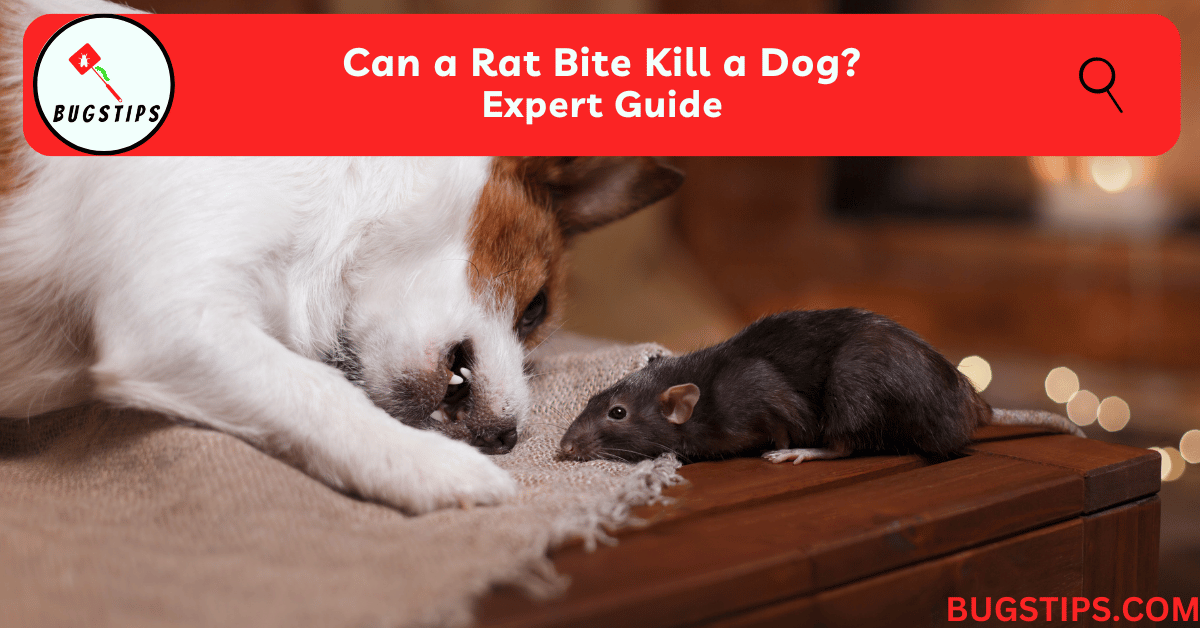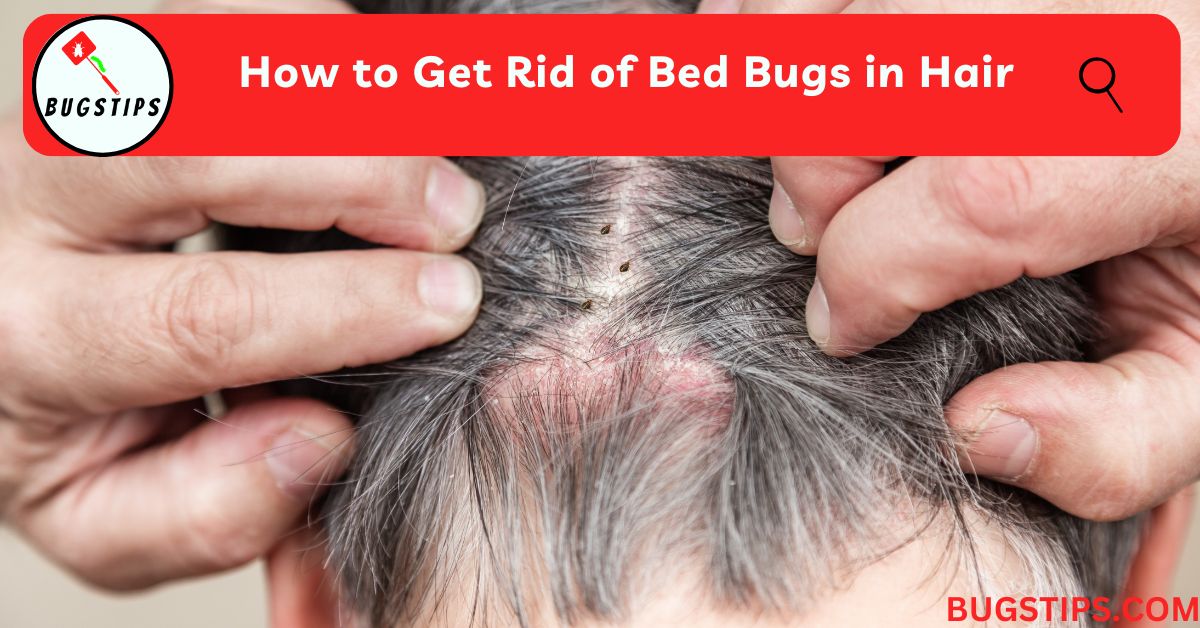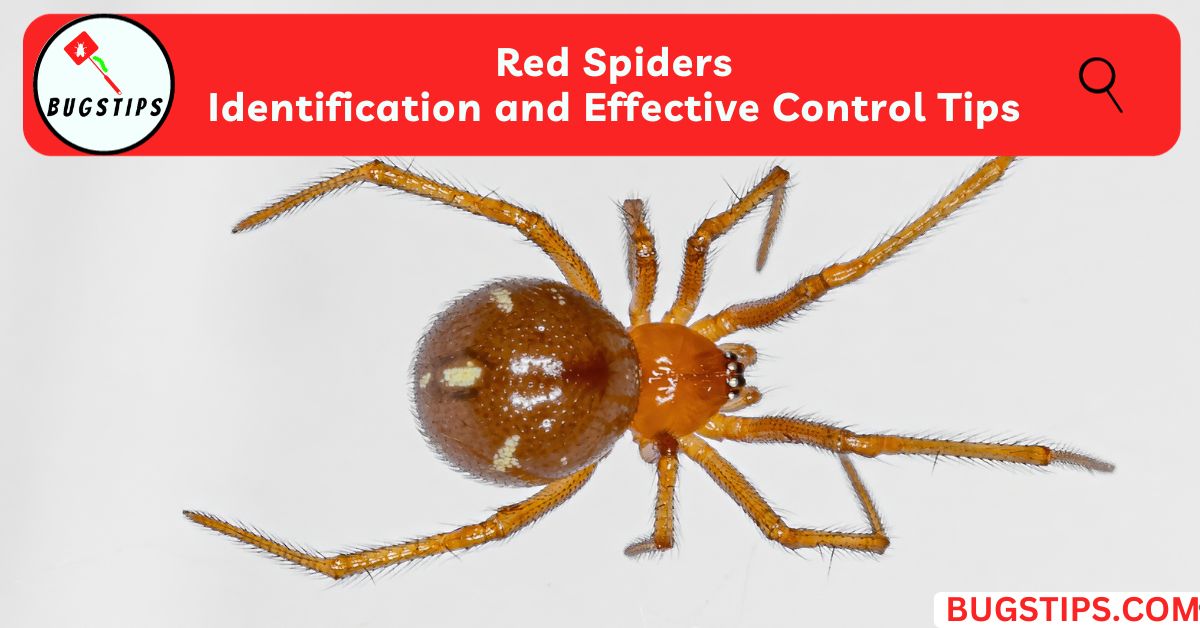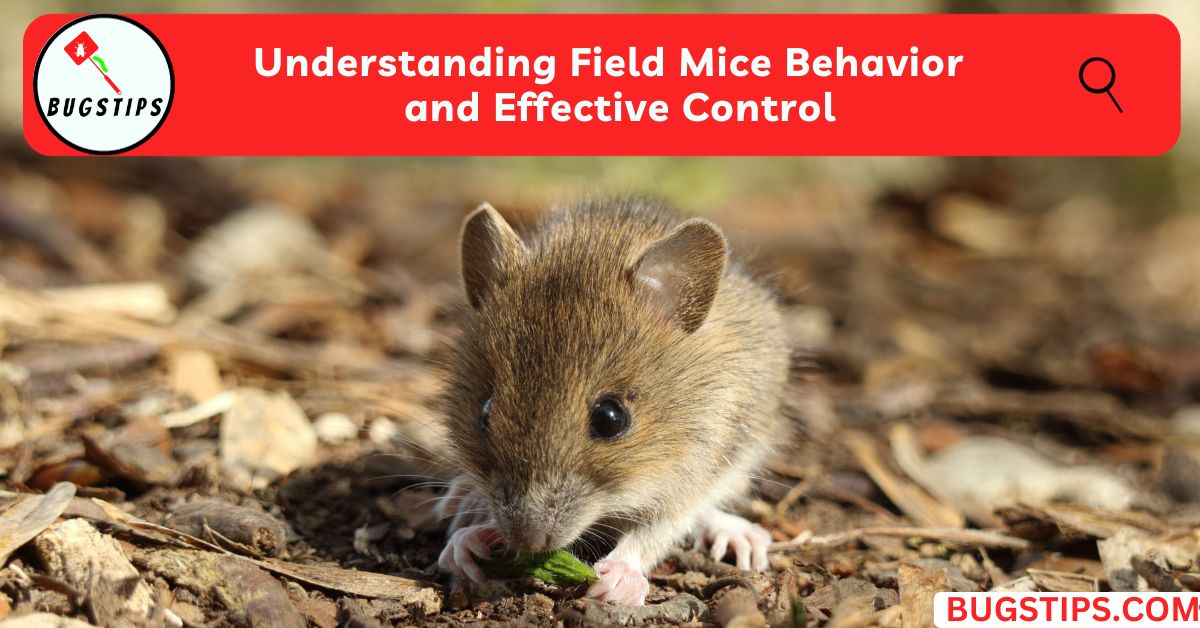This post may contain affiliate links which means as an Amazon Associate, this site may earn a small commission on qualified purchases made through links at no extra cost to you. Learn more on Affiliate Disclosure
Of all the potential dangers lurking in our homes and surroundings, the thought of a rat bite killing our furry friends is undoubtedly a nightmare for any dog owner.
But can a rat bite kill a dog?
In this article, we will explore this question and delve into the potential consequences of a rat bite on a dog.
We will also provide advice on what to do if your dog eats a rat, what to do if your dog has been rat poisoned, and how to safely and effectively get rid of rats when you have a dog.
So, if you’re a dog owner looking to keep your pet safe from these pesky rodents, keep reading to learn more.
Can a Rat Bite Kill a Dog?
What Happens if a Rat Bites Your Dog?
When a rat bites a dog, it can lead to a variety of potential consequences that require immediate attention and care and it’s important to understand the potential risks.
Here are some potential consequences of a rat bite on a dog.

Infection
- One of the most common risks, if your dog is bitten by a rat, is the chance of infection developing, especially if the bite is deep.
- Infected bite wounds are usually painful, swollen, and red, and may discharge at the site of the wound.
Diseases
- Rats can carry diseases that may infect your dog, such as leptospirosis and rat-bite fever.
- Leptospirosis is caused by the Leptospira bacteria found in rat urine.
- If your dog contracts leptospirosis, it can lead to severe symptoms and potentially be fatal if left untreated.
- Rat-bite fever, on the other hand, is caused by certain bacteria present in rat saliva and can cause flu-like symptoms in dogs.
Nasty Symptoms
- Apart from the risk of infection and diseases, a rat bite can cause a wide range of symptoms in dogs.
- These may include skin lesions and unexplained open wounds appearing even days or weeks after the initial bite.
Fatalities
- While it is relatively rare for a rat bite alone to be fatal to a dog, severe infections or untreated diseases resulting from the bite can have life-threatening consequences.
- In particular, if your dog suffers from a severe rat bite or gets bitten by an infected or poisoned rat, the risk of fatality increases.
Being aware of these risks and understanding the potential consequences of a rat bite on your dog will help you take necessary precautions and seek timely veterinary assistance.
Related Article – Managing Rats in Sewers
Can a Rat Hurt a Small Dog?
Small dogs, due to their smaller size, may be more vulnerable to rat bites compared to larger dogs.
Rats are known to be opportunistic and aggressive when it comes to defending themselves or seeking food.
Given the size difference between small dogs and rats, it is possible for a rat to bite a small dog more easily than a larger dog.
Furthermore, small dogs may not have the same level of strength and defensive capabilities as larger breeds, making them more susceptible to injuries from rat bites.
The sharp teeth of rats can penetrate their skin more deeply, increasing the risk of damage to muscles, nerves, and blood vessels.
The potential risks of rat bites on small dogs extend beyond physical harm. As mentioned earlier, rat bites can lead to infections and the transmission of diseases.
These risks are not dependent on the size of the dog, as rats can carry harmful bacteria and diseases regardless of their target.
Therefore, small dogs are just as vulnerable to infection and diseases as larger dogs when bitten by rats.
Related Article – Rats Nest Explained | Your Infestation Solution
Symptoms of Rat Bite in Dogs
After being bitten by a rat, dogs may exhibit various symptoms that can indicate the presence of an injury or potential complications.
Here are some common symptoms that dogs may experience after a rat bite.
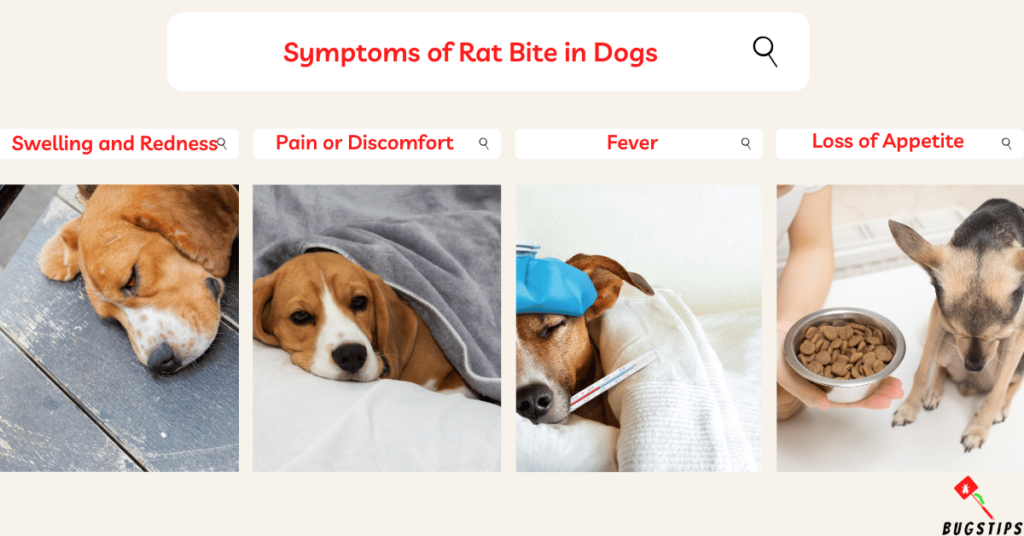
Swelling and Redness
- A noticeable swelling and redness around the bite wound can be an initial sign of a rat bite.
- The affected area may appear inflamed and tender to the touch.
Pain or Discomfort
- Dogs may exhibit signs of pain or discomfort, such as limping or favoring the injured area.
- They may be reluctant to put weight on the affected limb or exhibit sensitivity when the wound is touched.
Licking or Chewing at the Wound
- Dogs may instinctively lick or chew at the site of the rat bite.
- Excessive licking can further irritate the wound and delay the healing process.
Wound Drainage
- In some cases, a rat bite wound may discharge pus or fluid.
- The presence of discharge indicates an infection, and the wound should be addressed promptly by a veterinarian.
Changes in Behavior
- Dogs that have been bitten by a rat may exhibit changes in behavior.
- They may become more withdrawn, lethargic, or display signs of anxiety.
Fever
- A fever is a common symptom that may indicate an infection.
- If your dog’s body temperature rises above the normal range (around 101 to 102.5 degrees Fahrenheit), it is important to consult with a veterinarian.
Loss of Appetite
- Dogs that have been bitten by a rat may experience a temporary loss of appetite.
- They may show disinterest in food or exhibit decreased water intake
It's important to note that symptoms can vary depending on the severity of the bite and the dog's individual response.
You May Also Like – Mouse in Bedroom Can’t Sleep? | 7 Powerful Solutions
What To Do if Your Dog Gets Bitten by a Rat?
Discovering that your dog has been bitten by a rat can be a distressing situation. It’s crucial to take immediate action to ensure your dog’s safety and well-being.
Here are some steps you can take if your dog gets bitten by a rat.
Call Your Vet
The first and most important step is to contact your veterinarian. Inform them about the rat bite and any visible symptoms your dog may be experiencing.
Your vet will provide guidance on the next course of action, which may include bringing your dog in for an examination or providing further instructions based on the severity of the bite.
How to Clean a Rat Bite on a Dog
After veterinary assessment, you may be instructed to clean the rat bite at home. Note that this should be done under professional guidance.
If you have experience and proper instructions, follow these steps to clean the wound effectively and ensure your dog’s comfort during the healing process.
Remember to stay calm and gentle while following your vet’s recommendations.
- Restrain your dog if necessary to avoid any potential aggressive behavior during the cleaning process.
- Gently trim the fur around the bite area to ensure a clear view of the wound.
- Clean the wound with a mild antiseptic solution recommended by your veterinarian.
- Use a clean cloth or sterile gauze pad to apply the solution and gently remove any debris or dirt from the wound.
- Avoid using hydrogen peroxide or alcohol, as they can be irritating to the wound and delay the healing process.
- Apply a pet-safe antibiotic ointment as directed by your veterinarian to help prevent infection.
- Monitor the wound closely for any signs of worsening or persistent discharge. Contact your vet if you notice any concerning changes.
Home Remedies for Rat Bites on Dogs
While professional veterinary care is crucial for rat bites, there are some home remedies that can be used in conjunction with medical treatment:
- Epsom Salt Soak
- Dissolve Epsom salt in warm water and create a soothing soak for your dog’s affected area.
- This can help reduce inflammation and promote healing. Remember to follow the recommended Epsom salt-to-water ratio provided by your veterinarian.
- Dissolve Epsom salt in warm water and create a soothing soak for your dog’s affected area.
- Herbal Remedies
- Certain herbal remedies, such as calendula or tea tree oil (diluted and used sparingly), may possess antibacterial properties that can aid in the healing process.
- However, it’s essential to consult with your veterinarian before using any herbal remedies to ensure their safety and effectiveness for your dog.
- Certain herbal remedies, such as calendula or tea tree oil (diluted and used sparingly), may possess antibacterial properties that can aid in the healing process.
- Elizabethan Collar (E-collar)
- To prevent your dog from further irritating or licking the wound, your veterinarian may recommend using an E-collar.
- This collar will restrict your dog’s access to the bite area and promote healing.
- To prevent your dog from further irritating or licking the wound, your veterinarian may recommend using an E-collar.
Remember, while home remedies can complement professional veterinary care, they should never replace it. Rat bites can lead to severe infections and complications, so it's crucial to seek medical advice from your veterinarian.
You May Also Like – 16 Powerful Scents That Repel Chipmunks
Are Rats Afraid of Dogs?
Rats, unlike their more timid mouse relatives, are not easily intimidated by larger animals. When it comes to dogs, rats exhibit different responses.
While dogs may not possess the same rat-catching skills as cats, they have their own unique abilities that make them effective in managing rat populations.
Dogs have an exceptional sense of smell and acute hearing, which allows them to detect the presence of rats with ease.
Their territorial nature and eagerness to please their owners make them excellent candidates for rat detection.
With proper training, dogs can be trained to be constantly on the lookout for signs of rats, assisting in early detection and prevention.
It’s important to remember that individual rat behavior can vary. Some rats may display caution when encountering dogs, while others may exhibit boldness and confidence.
The relationship between rats and dogs depends on various factors, including the size and temperament of the dog, as well as the specific circumstances of their interaction.
Therefore, if you have concerns about rats in your area, leveraging your dog’s natural abilities can be a valuable asset.
By providing training and supervision, your furry companion can actively contribute to creating a more pest-free environment, helping to keep rats at bay.
Does Dog Urine Attract Rats?
Dog urine does not attract rats. On the contrary, rats can actually sense danger through a specific compound found in dog urine, which acts as a deterrent to rats.
Dogs are natural predators to rats, and rats instinctively try to avoid areas marked with the scent of dog urine.
While rats may be attracted to other sources such as food, the presence of dog urine generally repels them.
Therefore, you can rest assured that dog urine does not attract rats, but rather serves as a signal for them to stay away.
My Dog Killed a Rat, Should I Be Worried?
If your dog has successfully caught and killed a rat, it’s natural to have some concerns about the potential implications.
While every situation is unique, there are a few key points to consider when your dog has encountered and eliminated a rat.
Firstly, it’s important to recognize that dogs have innate predatory instincts, and hunting small animals like rats is a part of their natural behavior.
However, it’s crucial to determine if the rat was a wild rat or a pet rat.
Wild rats are more likely to carry diseases and parasites that can be transmitted to your dog through bites or contact.
In the case of a wild rat, it’s advisable to monitor your dog for any signs of illness in the days following the encounter.
Look out for symptoms such as vomiting, diarrhea, lethargy, or changes in appetite, as these may indicate the need for veterinary attention.
Additionally, check your dog for any injuries sustained during the encounter, such as bites or scratches, and treat them accordingly.
If the rat that your dog killed was a pet rat (if you have a pet rat in your home), the risk of disease transmission is typically lower compared to wild rats.
This is because pet rats are usually well cared for and undergo regular veterinary check-ups.
However, it's still a good idea to observe your dog for any unusual symptoms and seek veterinary advice if necessary. Even though the risk is lower, it's always better to err on the side of caution and ensure the ongoing health and well-being of your dog.
What Does Rat Poison Cause in Dogs?
Rat poison and other rodenticides are specifically designed to eliminate rodents, but the chemicals present in these products can be extremely toxic to dogs.
Once ingested, the poison can lead to a variety of symptoms in dogs, ranging from vomiting to organ failure. The toxic chemicals found in rat poison can cause severe consequences such as internal bleeding, kidney failure, and organ damage.
It’s important to be aware that there are three common types of rat poisons that pose a particular risk to dogs.
- Cholecalciferol
- This type of rat poison contains high levels of vitamin D3, which can result in toxic levels of calcium and phosphorus in a dog’s body.
- This can lead to kidney failure and other serious health issues.
- This type of rat poison contains high levels of vitamin D3, which can result in toxic levels of calcium and phosphorus in a dog’s body.
- Bromethalin
- Bromethalin is a neurotoxic rodenticide that affects the central nervous system.
- Ingesting this type of rat poison can cause brain swelling, leading to seizures, paralysis, and even death in dogs.
- Bromethalin is a neurotoxic rodenticide that affects the central nervous system.
- Anticoagulant rodenticides
- Anticoagulant rat poisons interfere with the blood’s ability to clot properly. This can result in internal bleeding that may not be immediately noticeable.
- Over time, the bleeding can lead to anemia, weakness, and, in severe cases, organ damage.
- Anticoagulant rat poisons interfere with the blood’s ability to clot properly. This can result in internal bleeding that may not be immediately noticeable.
How Soon Does Rat Poison Affect a Dog?
Rat poison can affect a dog within a few hours or several days, depending on the specific type of poison ingested.
The onset of symptoms of rat poisoning in dogs is typically not immediate and may take several days to become evident.
In some cases, symptoms can even be delayed by a week or more.
Can A Dog Recover From Rat Poisoning Without Treatment?
While some dogs may recover without treatment if the ingestion was minimal and immediate veterinary care was sought, rat poisoning is a life-threatening condition. Without proper treatment, the consequences can be fatal.
It is essential to understand that the amount of rat poison lethal to dogs depends on factors such as the dog’s size and the specific active ingredient.
Even if your dog appears to be recovering, professional medical attention is necessary for a comprehensive evaluation and appropriate treatment.
Always bring any remaining bait or packaging to the veterinarian to assist in identifying the type of poison involved.
How Do You Get Rid of Rats When You Have a Dog?
Creating a safe and rat-free environment when you have a dog requires careful consideration and effective strategies.
By implementing proper methods, you can tackle the rat problem while ensuring your furry friend’s well-being.

So here we will provide various approaches to safely and effectively get rid of rats when you have a dog.
Use Traps
- One of the safest ways to get rid of rats when you have a dog is to use traps.
- Make sure to use traps that are specifically designed for rats and are placed in areas where your dog cannot reach.
- You can use bait like peanut butter or cheese to lure the rats into the trap.
- Once the rat is caught, dispose of it safely and keep your dog away from the area.
Use Natural Remedies
- Another safe option is to use natural remedies to repel rats.
- Some effective natural deterrents include peppermint oil, cloves, and vinegar.
- Simply soak cotton balls in the solution and place them in areas where rats are likely to be found.
- These substances are safe for dogs and will not harm them if accidentally ingested.
Hire a Professional Exterminator
- If the rat infestation is severe, it may be necessary to call in a professional exterminator.
- Make sure to choose a pest control company that uses safe and pet-friendly methods.
Before the extermination, make sure to inform the exterminator about your dog and ask them to take necessary precautions to ensure your pet’s safety.
Related Article – Boric Acid for Mice | Does Boric Acid Kill Mice?
Regardless of the method you choose, it's important to keep your dog away from any areas where rats are present. By using safe and effective methods, you can ensure that your dog is not harmed while dealing with the rat problem.
Final Thoughts
While a rat bite can pose risks to dogs, the chances of it being fatal are low. However, immediate veterinary care is essential to address potential infections and diseases.
Preventive measures, such as rat control and regular veterinary check-ups, can help protect your dog’s well-being. Stay proactive in maintaining a clean environment and consult with your vet for additional guidance.
Prioritizing your dog’s safety will minimize the risks associated with rat bites and ensure their overall health.
FAQs
What should I do if my dog gets bitten by a rat?
What does a mouse bite look like on a dog?
A mouse bite on a dog usually appears as small puncture wounds or cuts on the body. The wound or cuts may be swollen, red, or bleeding. If the bite gets infected, you may notice the presence of pus.
Can a dog get sick from killing a rat?
Yes, dogs can get sick from killing a rat. Rats are known to spread diseases, so it’s important to seek professional veterinary advice after any known contact with a rat.
Can a dog get rabies from a rat?
No, rats are not known to carry rabies, so a dog cannot get rabies from a rat.
Are dogs friendly to rats?
It depends on the dog’s personality and training. Some dogs may be friendly to rats, while others may see them as prey.
Can a dog recover from rat poisoning without treatment?
It is unlikely that a dog can recover from rat poisoning without treatment. If you suspect your dog has ingested rat poison, it is important to seek veterinary care as soon as possible to minimize the time between exposure and treatment.
How do I know if my dog has been rat poisoned?
Symptoms of rat poisoning in dogs may include vomiting, diarrhea, lethargy, loss of appetite, pale gums, coughing, difficulty breathing, seizures, and even death.
Resources – (for further reading)
RoSPA – Weil’s disease (leptospirosis)
Iowa State University – Rat Bite Fever – CFSPH
MSD Veterinary Manual – Leptospirosis in Dogs – Generalized Conditions

